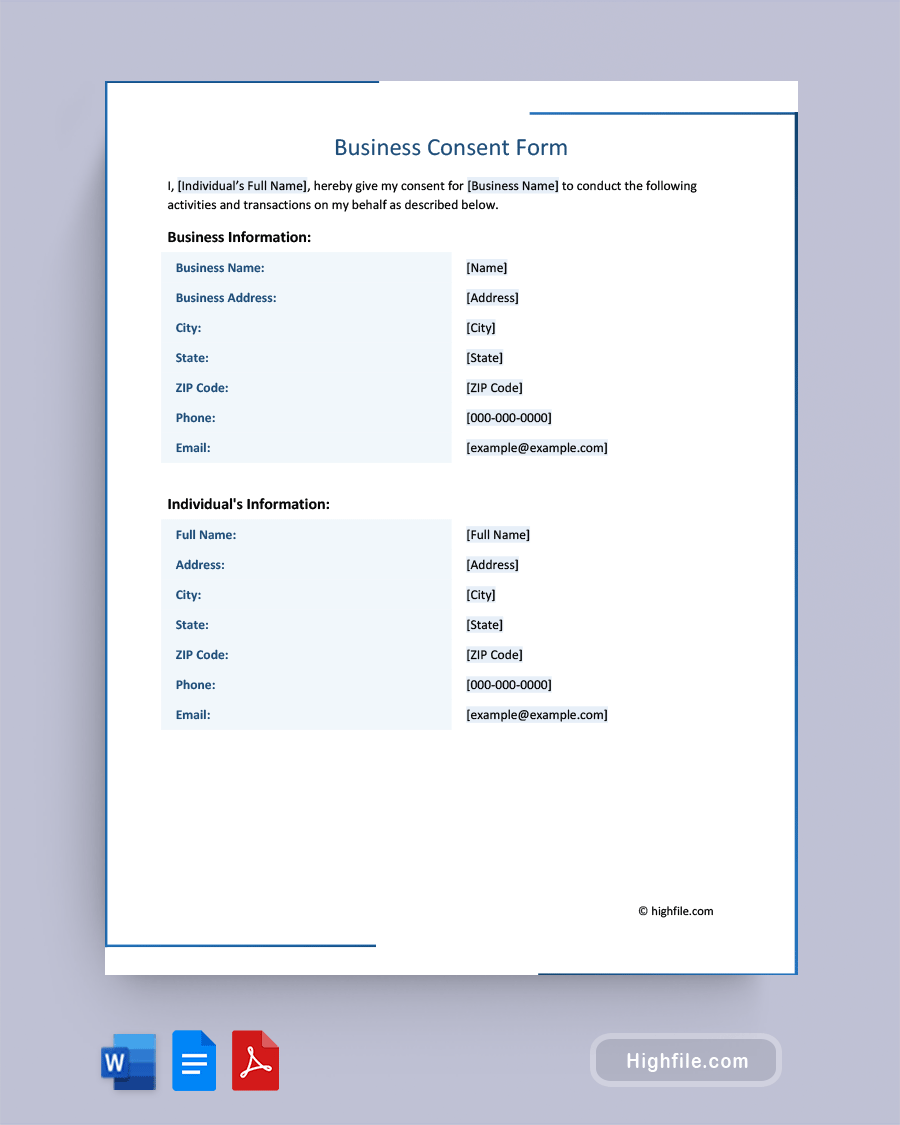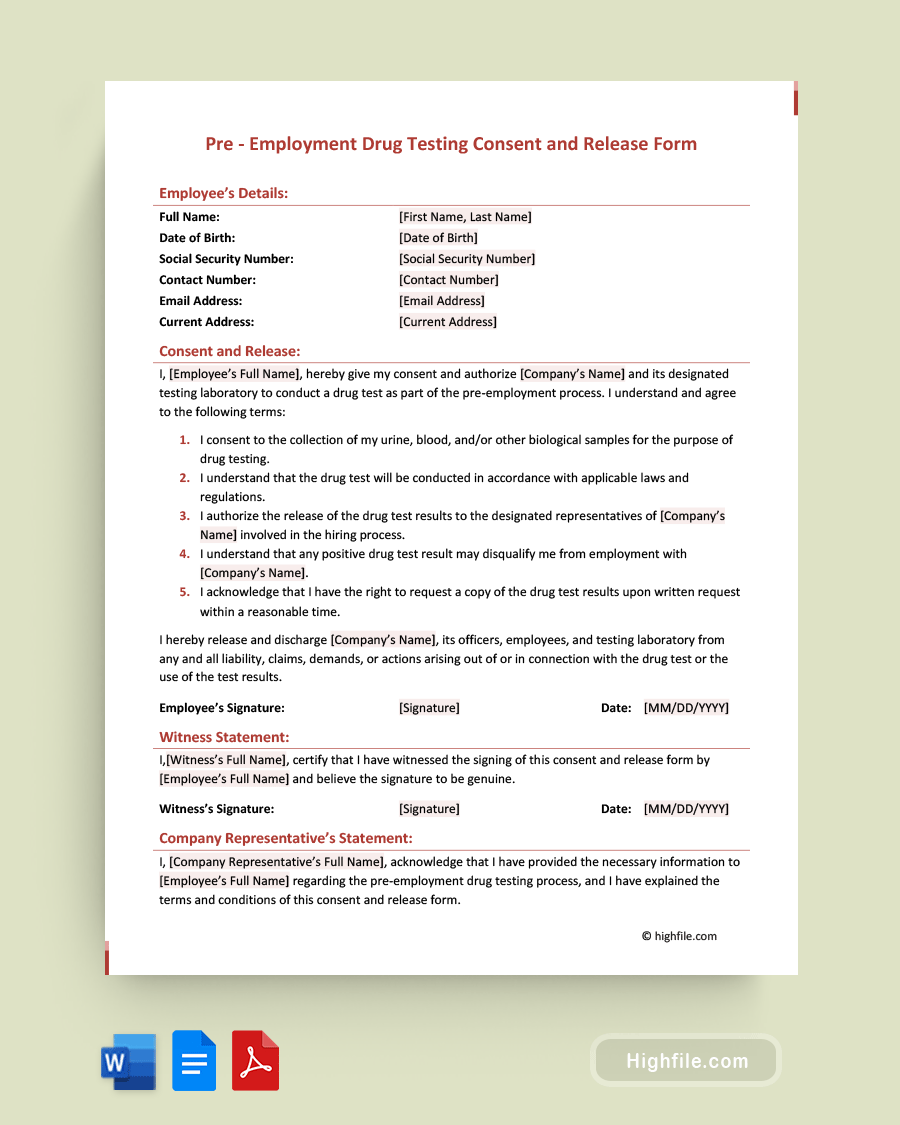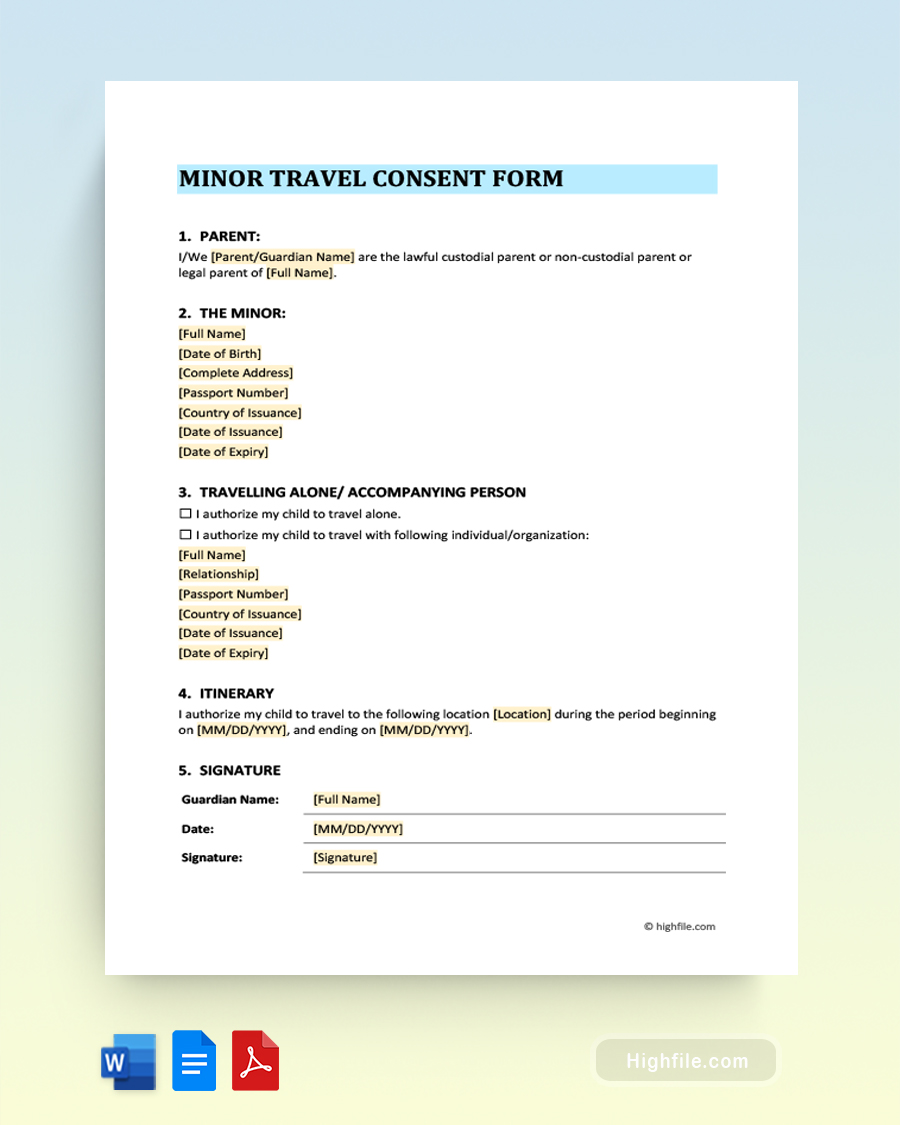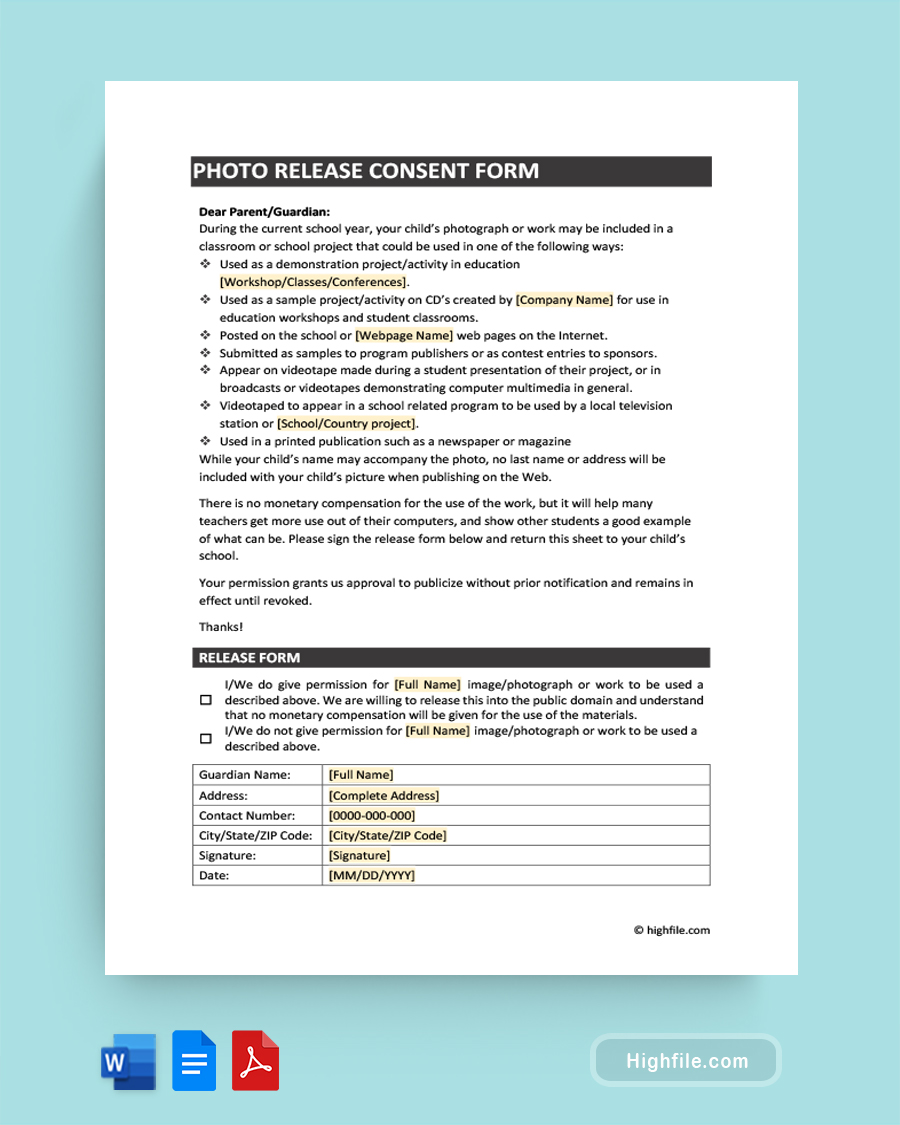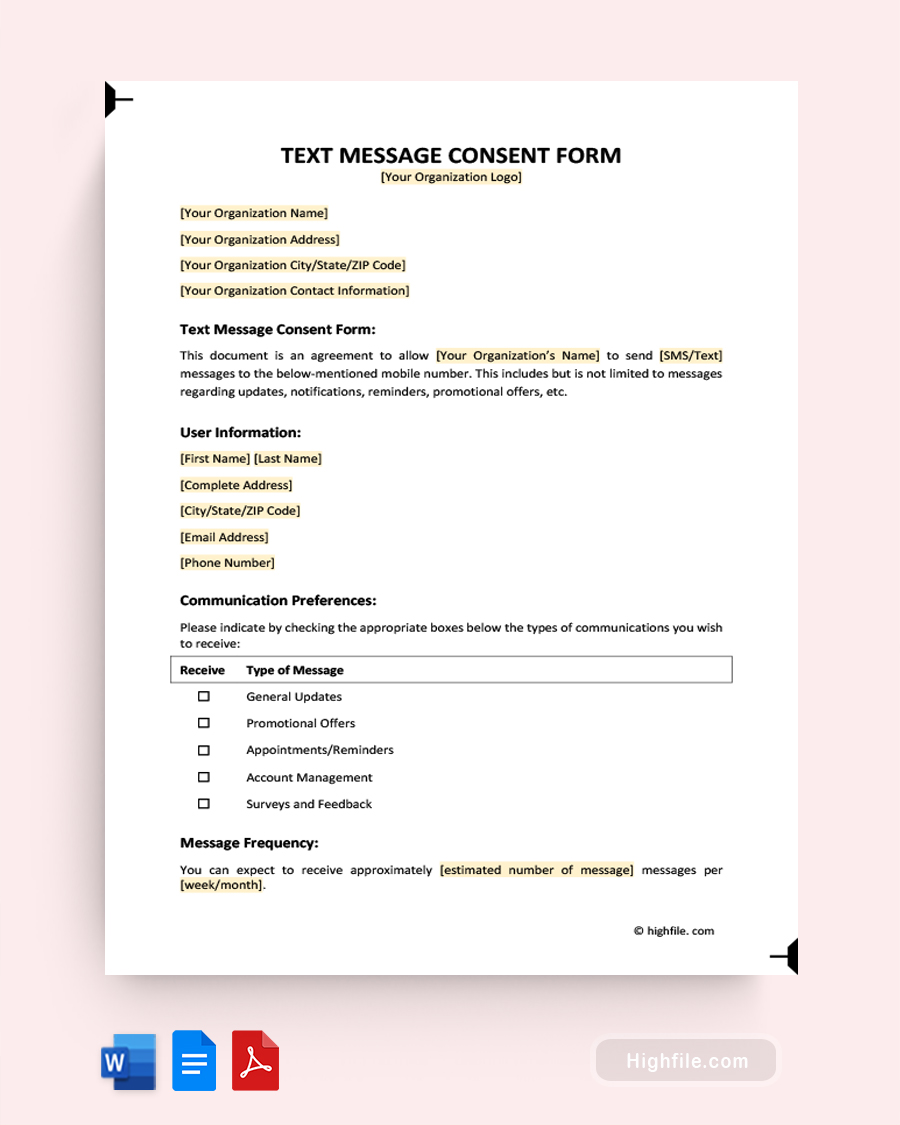Doing business often requires extensive paperwork and documentation to protect your interests and record your transactions. A Business Consent Form outlines the terms and conditions of a business relationship between two or more parties. It is a binding agreement that defines the expectations and limitations of the business relationship, including the collection and use of personal information, liability protections, and intellectual property rights. These vital documents are typically used in industries such as healthcare and finance, where obtaining consent involves navigating complex legal and ethical considerations.
What Is a Business Consent Form?
A business consent form is a legal document used to obtain consent or authorization from individuals or organizations for various business purposes. This may include obtaining consent for marketing purposes, sharing information with third-party vendors or partners, conducting background checks on employees, or other similar purposes. The form typically outlines the specific details of the agreement or authorization, and it must be signed by the individual or organization providing the consent.
Why Is a Business Consent Form Important?
A business consent form is important because it helps businesses obtain explicit and informed consent from individuals or organizations before collecting, using, or sharing their personal or confidential information. This document can help protect the company and the individual or organization from potential legal or ethical issues arising from the improper use or disclosure of personal information.
Essential Components of Business Consent Form
The essential elements of a Business Consent Form show who the parties are, the scope and duration of the agreement, their respective duties, and a waiver of liability. Below is a brief outline of what to expect on your template and why it’s necessary.
- Form Title- This says “Business Consent Form” in large bold print to identify the document.
- Business Information- The name and contact information for the business go here.
- Individual Information- The name and contact information for the individual go here.
- Scope- This section can include an additional sheet if necessary. It details the scope of transactions and activities and any limitations or special instructions.
- Assent Statements- These statements show additional agreements, such as providing necessary information and agreeing to allow the business to act on behalf of the individual.
- Consent and Duration Statement- This says that the person signing agrees and the contract is valid until canceled in writing.
- Individual’s Signature and Date Line- The individual being represented signs here.
- Business Representative Signature and Date Line- A representative of the business entity signs here.
- Printed Name and Title- This line shows the printed name and position of the representative.
Pro Tip: Industries like healthcare and finance operate in highly regulated environments, where obtaining business consent involves navigating complex legal and ethical considerations. Consequently, developing and implementing consent forms become a vital focal point for businesses and organizations, demanding substantial resources and specialized expertise.
Understanding the Legal Implications of Business Consent Forms
Understanding the legal implications when creating and using Business Consent Forms is essential. Some key concepts to keep in mind include the following:
- Compliance with Data Protection and Privacy Laws: Businesses must ensure that their consent forms are compliant with data protection and privacy laws, such as the General Data Protection Regulation (GDPR) in the European Union and the California Consumer Privacy Act (CCPA) in the United States.
- Contractual Obligations: A Business Agreement Form is a binding agreement between the parties involved, outlining the business relationship’s terms and conditions. By signing the form, the individual agrees to the outlined terms.
- Limitations on the Scope of Consent: Consent obtained through a consent form is generally limited to the specific purpose or activity for which it was obtained. Businesses should ensure that their consent forms specify the scope of the consent and do not exceed it.
- Admissibility in Legal Proceedings: Consent forms can be used as evidence in legal proceedings to demonstrate that an individual or organization has given their informed consent to collect, use, or disclose their personal information. However, for a consent form to be admissible, it must have been obtained in a manner that is legally valid.
- Obligations to Notify: If a business changes how it collects, uses, or discloses personal information after obtaining consent, it may need to notify individuals and get their permission again.
- Liability Protection: A Business Agreement Form can help safeguard the business from any legal liabilities arising from the business relationship. The form can help prevent misunderstandings and legal disputes by clarifying expectations and limitations.
- Intellectual Property Rights: In some cases, a Business Agreement Form may contain provisions regarding intellectual property ownership, such as copyright or trademark rights. It’s essential to review these provisions to ensure their fairness and reasonableness.
- Legal Compliance: Depending on the industry and nature of the business relationship, there may be legal requirements for the contents and use of the consent forms. It is crucial to seek legal counsel to ensure the Business Agreement Form complies with all applicable laws and regulations.
It is vital for businesses to consult with legal professionals to ensure that their consent forms are legally valid and compliant with applicable laws and regulations.
FAQs
Here are the answers to some of the most frequently asked questions on this topic:
If the information provided in a consent form is inaccurate or outdated, it could lead to legal issues or other negative consequences for both the business and the individual or organization providing the consent. For example, if a company obtains permission to use an individual’s personal information for marketing purposes, but the information provided is incorrect or outdated, the individual may not receive the intended marketing communications, or the business may unknowingly violate privacy laws by using the data without proper consent.
To avoid these issues, businesses must ensure that the information provided in consent forms is accurate and up-to-date and regularly review and update consent forms annually or when there have been changes in policy, practice, or laws. The revisions help ensure compliance with applicable laws and regulations. Additionally, businesses should make sure to clearly communicate the purposes and terms of any consent agreements to individuals and allow them to ask questions or clarify any concerns they may have before providing their consent.
In many cases, obtaining consent for various business purposes, such as for marketing or data-sharing activities, is required by law. However, the specific requirements may vary depending on the type of business and the applicable laws and regulations in the relevant jurisdiction. It is essential for companies to understand and comply with any legal requirements for obtaining consent and to use appropriate consent forms or processes to ensure compliance. If you are uncertain about local laws and standards, please consult a business attorney for clarification.
A properly executed business consent form can be used as evidence in legal proceedings, particularly if it relates to a specific agreement or authorization that is being disputed. However, whether or not a consent form will be admissible as evidence will depend on a number of factors, including the specific circumstances of the case, the applicable laws and regulations, and the content and wording of the consent form itself.
To help ensure that a consent form will be admissible as evidence, businesses should take care to use unambiguous language and obtain signatures or other records of affirmative consent from the individuals or organizations involved. Additionally, companies should retain copies of all signed consent forms and related documentation in a secure and easily accessible location in case they are needed for future legal proceedings.
Generally, a business consent form can be used for marketing or promotional purposes, but only if it has been expressly authorized by the individual or organization providing the consent. Businesses should clearly outline how, when, and why they will use the information provided in the consent form, including any marketing or promotional activities, and obtain affirmative consent from the individual or organization before using their data for such purposes.
It is important to note that many jurisdictions have specific laws and regulations governing the use of personal information for marketing or promotional purposes, such as the General Data Protection Regulation (GDPR) in the European Union. Businesses should ensure that their use of consent forms and personal information complies with all applicable laws and regulations and that they have obtained the necessary consent or authorizations before using personal data for marketing or promotional purposes.
Key Points
A Business Consent Form is a legal document that defines the terms and conditions of a business relationship. It outlines expectations and limitations, including the collection and use of personal information, liability protections, and intellectual property rights. This form protects the interests of all parties involved in the business relationship and ensures compliance with relevant laws and regulations. Using our Business Consent Form Template will help you quickly and efficiently create a custom document for your business.
